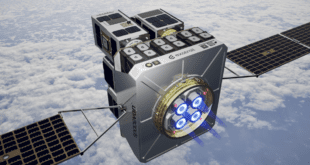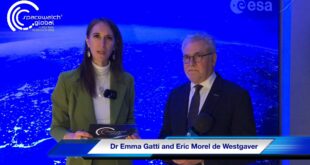
Paris, 13 January 2021. – The French new space start-up Exotrail used the 13th European Space Conference to announce the successful in-orbit demonstration of its innovative electric mini-propulsion system.
“Exotrail reports full success of first-ever cubesat mission equipped with Hall-effect electric propulsion technology,” the company said yesterday. “Through an In-Orbit Demonstration mission launched to Low Earth Orbit on 7th of November 2020 onboard a PSLV rocket, Exotrail nominally ignited its ExoMG Hall-effect electric propulsion system on the first attempt.”
Hall-effect thrusters are mainly used on large satellites due to their superior efficiency compared to other electric propulsion technologies, Exotrail says. “Legacy systems, however, are the size of a fridge and require kilowatts of power. Exotrail’s nanosatellite thruster runs on 50 watts of power and is equivalent in volume to 2 liters of soda.”
On top of “designing and packing world-leading innovations at the thruster level”, Exotrail claims to have managed the integration of the propulsion system inside the 10 kilograms spacecraft.
Small satellite constellations (ranging from 10 to 250 kilograms) “will now be able to quickly change their orbit once in space, giving new capabilities for satellite operators: more flexibility in their launch strategy, dramatic performance increases, collision avoidance and safe de-orbiting to prevent space pollution”, Exotrail said.





